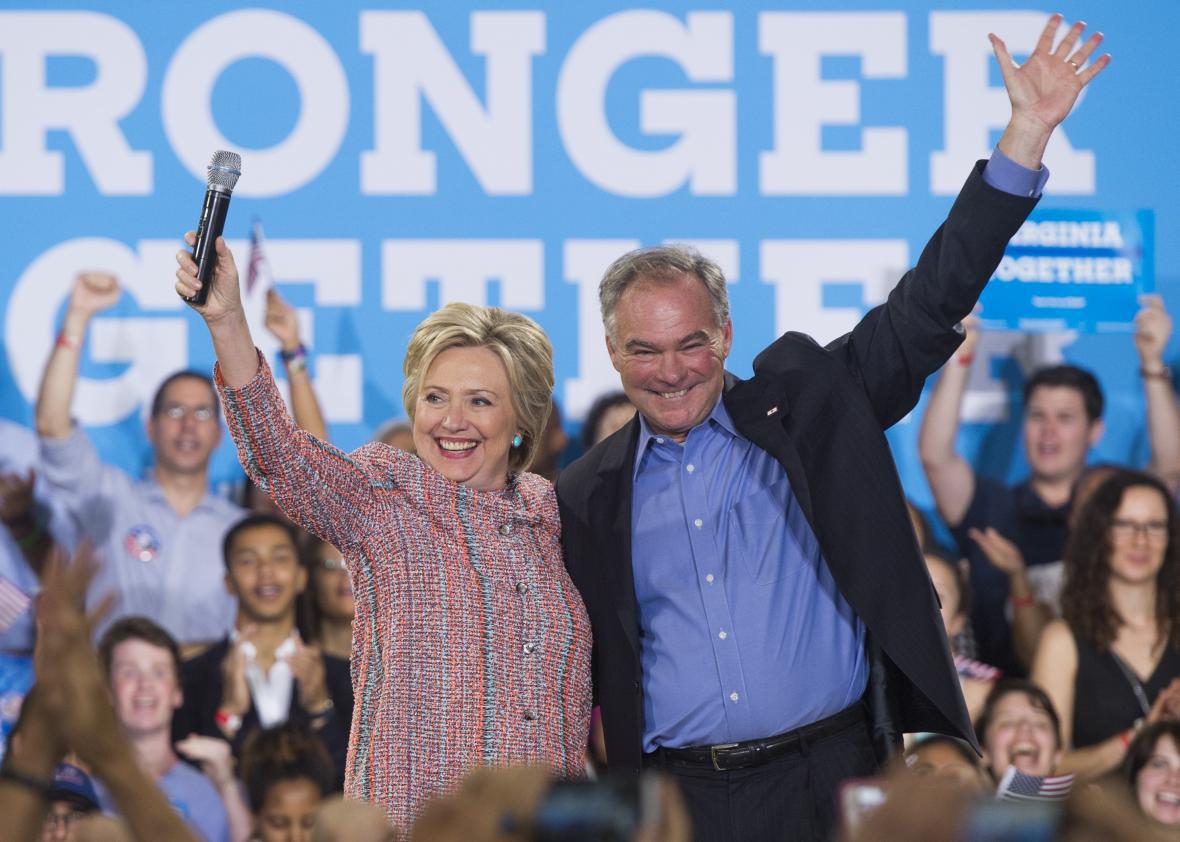The pick is in: Hillary Clinton has selected Sen. Tim Kaine as her running mate.
The Clinton camp had teased the announcement all day—promising supporters they’d learn the news via text message or social media—but in the end, they ultimately leaked the news to major media outlets moments before making it official on Twitter.
Timing aside, the pick was the opposite of a surprise. Kaine, a former governor, had long been considered to be at the top of Clinton’s wish list, and while a few other bolder names popped up this year—Elizabeth Warren chief among them—he was always the favorite to win the job. It also didn’t hurt that the last previous Democratic presidents effectively served as Kaine’s job references.
Kaine’s selection was being hailed as a safe, do-no-harm pick by the Beltway set even before it became official, and in many ways it is, since Kaine plugs so neatly into Clinton’s existing steady-hand pitch to voters. He sits on the Senate’s Armed Services and Foreign Relations committees, giving him the national security experience and foreign policy chops that Clinton already has but has suggested she wants more of on the ticket. His time in the Virginia governor’s mansion—and, to a much lesser degree, as mayor of Richmond—gives him the executive experience that will allow Democrats to argue that he’d be able to step in and lead the country if it ever came down to it. And—let’s be frank—he’s also an older white dude, which won’t add to the already historic nature of a female-led ticket but simultaneously won’t risk further upsetting the not-insignificant slice of American voters who are terrible.
Added bonuses for Democrats: Kaine’s selection won’t hurt their chances of retaking the Senate this fall. If Clinton wins in November, Kaine’s successor in the chamber will be chosen by the state’s Democratic governor, Terry McAuliffe. The same couldn’t be said for Warren, New Jersey Sen. Cory Booker, or Ohio Sen. Sherrod Brown, all of whom would have had their vacated seats filled by a designee of a GOP governor. And at 58, Kaine is still young enough where his age theoretically wouldn’t be an issue in 2024.
He also speaks Spanish fluently, a skill that will come in handy as Democrats attempt to win over Hispanics (though his fellow short-listers Labor Secretary Tom Perez and HUD Secretary Julian Castro would have offered more in the way of appeal on that front). Furthermore, a VP debate between Kaine and Trump’s pick, Indiana Gov. Mike Pence, will feel about as far away from must-see-TV as possible for many voters, which should allow the Clinton camp to keep the focus where they want it: on Trump.
Who won’t like the pick? Bernie Sanders fans and other like-minded progressives! Kaine is a Clinton-style centrist who served as the head of the Democratic National Committee, aka the very “establishment” that many Sanders supporters believe rigged this year’s primary in Hillary’s favor. They also won’t be thrilled to learn about Kaine’s relative friendliness toward Wall Street and his unabashed love of free trade. Even before the pick was official, some on the left were already voicing their frustration. “Hillary Clinton’s vice-presidential pick will be seen by many as a proxy for how she will govern—boldly, or cautiously?” Stephanie Taylor, a co-founder of the Progressive Change Campaign Committee, told the New York Times, leaving little doubt which of those two words she’d associate with the selection of Kaine. The Virginia Democrat’s views on abortion could also be a touchy subject for some on the left. He’s generally pro-choice but, as an observant Catholic, he’s personally opposed to abortion, leaving him behind the liberal trend line on that issue.
By selecting Kaine, Clinton is banking on the fact that, faced with the prospect of a President Trump, progressives will have no other choice but to vote for her this fall. Instead, this pick can be seen as a play for moderates and Republican-leaning voters who remain skeptical—or flat out terrified—of Trump, but might have been turned off by seeing a fiery progressive (and woman) like Warren as Clinton’s No. 2.
Still: History suggests that running mate selections have, at most, a limited impact on the election’s ultimate outcome, so it would be a mistake to make too much of how Kaine will influence the race. Presidential elections are decided at the top of the ticket, and it’s hard to imagine there are a whole lot of voters out there who remain on the fence about the two most disliked presidential candidates in modern history but will instead somehow make up their minds after meeting Tim Kaine, a man who wears the word “boring” as a badge of honor.
